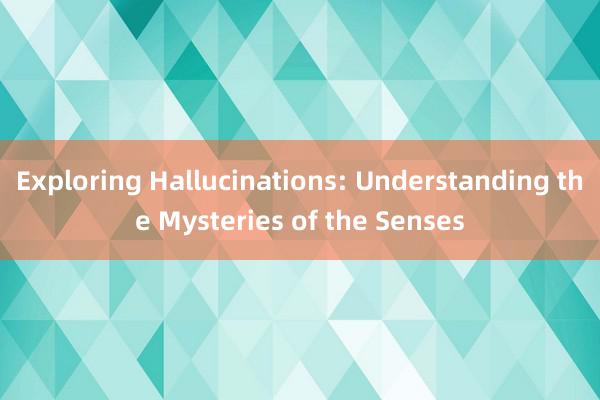
### Exploring Hallucinations: Understanding the Mysteries of the Senses
Hallucinations, often described as vivid sensory experiences that occur without any external stimuli, have long fascinated scientists and philosophers alike. These phenomena, which can manifest in any sense (sight, hearing, touch, taste, or smell), challenge our understanding of perception and reality. This article delves into the mysteries surrounding hallucinations, exploring their nature, causes, and potential implications for our understanding of the brain and consciousness浙江三佳利胶带有限公司.
#### The Nature of Hallucinations
At their core, hallucinations are a type of perceptual experience that occurs without an external source. They can be categorized into several types based on their origin and characteristics:
- **Somatic Sensory Hallucinations**: These involve sensations in parts of the body where no actual stimuli exist, such as feeling pain or pressure.
- **Visual Hallucinations**: These are perhaps the most commonly recognized type, involving seeing objects, 强大厂家网 - 订做厂家|养生厂家|气动 people, 青岛丰善国际贸易有限公司 or patterns that do not actually exist.
- **Auditory Hallucinations**: Hearing sounds or voices that are not present in the environment.
- **Olfactory,镇雄人才网_镇雄招聘网_镇雄人才招聘网 Gustatory, and Tactile Hallucinations**: These involve smells, tastes, and sensations of touch, respectively,浙江三佳利胶带有限公司 without any external cause.
#### Causes of Hallucinations
Hallucinations can be triggered by a variety of factors, including:
- **Psychological Conditions**: Mental health disorders such as schizophrenia, bipolar disorder, and depression are often associated with hallucinations. In these cases, the brain's processing of information becomes distorted, leading to false perceptions.
- **Substance Use**: Certain drugs, both legal and illegal, can induce hallucinations. This is because they alter brain chemistry, affecting areas responsible for sensory perception.
- **Brain Damage or Disorders**: Conditions like strokes, brain tumors, or neurological disorders can disrupt normal brain function, causing hallucinations.
- **Sleep Disorders**: Sleep deprivation or certain sleep disorders can also lead to hallucinatory experiences, particularly during rapid eye movement (REM) sleep.
#### Implications for Neuroscience and Consciousness
The study of hallucinations offers profound insights into the workings of the human brain and the nature of consciousness. It challenges us to consider how the brain processes sensory information and how disruptions in this process can lead to such extraordinary experiences. Researchers are increasingly focusing on the neural mechanisms underlying hallucinations, using advanced imaging techniques and cognitive experiments to map brain activity during these states.
斑马泵阀网_泵_阀门_制造供应泵阀门网Moreover, the exploration of hallucinations has practical applications in fields such as virtual reality and artificial intelligence, where understanding how the brain generates complex sensory experiences could lead to more realistic simulations and enhanced user experiences.
#### Conclusion
Hallucinations, while mysterious and often perplexing, are crucial for advancing our knowledge of the human mind and brain. By unraveling the complexities behind these phenomena, we gain deeper insights into perception, consciousness, and the intricate workings of the nervous system. As research continues, the mysteries of hallucinations may yet yield new discoveries that reshape our understanding of the senses and the world we perceive.